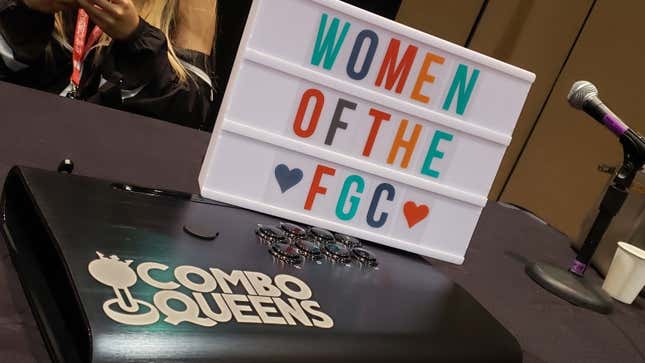
Evo 2019 hosted a special panel titled “The Women of the FGC,” allowing female members of the community the opportunity to speak about their experiences within the competitive fighting game space. While the hour-long discussion would touch on a variety of topics, there was one clear through-line expressed by the women on stage: “Listen to us.”
For the past few years, the Evolution Championship Series has expanded from simply being the largest tournament for fighting game competition in the world to also including discussion panels about varied related subjects conducted by community members. In addition to panels on streaming, applying for sponsorships, and learning frame data, an hour was set aside for a group of women to talk about how the scene can further improve its inclusivity.
The women invited to speak came from a variety of backgrounds, including competitors, event organizers, community supporters, and everything in between. Samantha “Persia” Hancock and Carolyn “MamaDao” Dao have established organizations like XO Academy and Combo Queens to give women the tools to excel in the fighting game community and find support from other female competitors. Sherry “Sherryjenix” Nhan has played Street Fighter for close to a decade and now helps foreign players gain visas to play in the United States. Ricki Ortiz is perhaps one of the most accomplished competitors of all time, and she was joined by up-and-comer Mahreen, who participated in the XO Academy program and is attending Evo thanks to support from the Street Fighter subreddit. Caitlyn “Eidelonn” Thiher is co-director of Combo Breaker, arguably the second-most important fighting game event of the year after Evo. Emily “NyxRose” Tran owns Equinox Gaming, a competitive gaming team that supports a handful of Street Fighter V and Tekken 7 players. And finally, these women were also joined by special guest Junae Benne, an esports host and streamer who provided her own takes on the gaming scene.
To say these women are important to the fighting game community would be an understatement, but there was still some pushback online when the panel was announced, with some questioning why the panel was necessary. In the days leading up to Evo, Carolyn Dao reiterated that the panel was meant to “inspire more women to get into the scene.” Eventual Soulcalibur VI finalist Marie-Laure “Kayane” Norindr similarly defended its necessity on Twitter, writing, “I’m grateful to live in the FGC, but I also had to face some toxic attitudes. I can understand why some women are intimidated to join us.”
Come the day of the panel, the room was packed with attendees who wanted to listen to these women tell their stories, including a few of the Evo head honchos themselves. The women immediately opened the floor to questions, which were fielded by Dao in the audience and then relayed to the group on the stage. These inquiries ran the gamut, from basic inquiries about what the fighting game community can do to improve its events for female attendees, to questions about how to overcome the ubiquitous hurdles of competitive ambition. This allowed the panelists to share their experiences in the scene and offer suggestions on what can be done to improve a community that, while more inclusive than the rest of esports, still has work to do with regard to how it treats women.
Ricki Ortiz and Sherry Nhan, for instance, have both dealt with stalkers due to their prominence in the fighting game community. Nhan in particular said she was worried about going public after receiving little help from the authorities and tournament organizers. It wasn’t until she made a YouTube video describing the harassment she was receiving that events began taking steps to keep her stalker out of tournaments.
The panelists also provided clear, concise suggestions to the folks in attendance. “Listen,” they implored, after explaining that women have been open about these issues but have previously had their concerns fall on deaf ears. “When a girl at your local comes up to you and says they have a problem, take them seriously and then go talk to the person that did something bad,” Caitlyn Thiher said. “The biggest thing that I, as a tournament organizer, experience is women coming up to me, and they don’t just talk to me about what happened to them at the huge event that we’re at. It goes all the way back to their locals. Just listen and take it at face value.”
They also stressed the importance of keeping fellow tournament attendees in check, in essence saying something in response to casual and overt misogyny, especially if the person doing that is one of your friends. The panelists explained how little things like this contribute to an unwelcoming atmosphere. Making it clear that the community isn’t going to stand for that kind of nonsense could go a long way towards making the space more inclusive.
The fighting game community has long been lauded as a diverse space in the world of esports. Any number of factors could have contributed to this, but it’s clear walking into a tournament like Evo and being greeted by a wide array of faces that the fighting game scene includes people of many different ages, races, and backgrounds. That said, it’s still very much a dude thing, despite there being no inherent “men only” rule. The Women in the FGC panel at Evo 2019 was an important step towards improving the fighting game community for everyone, and if the scene is going to grow, the folks on stage need to be heeded both by those in positions of power and by the average Joes going 0-2 in pools.
If you want to check out video of the full panel, archives are available here.